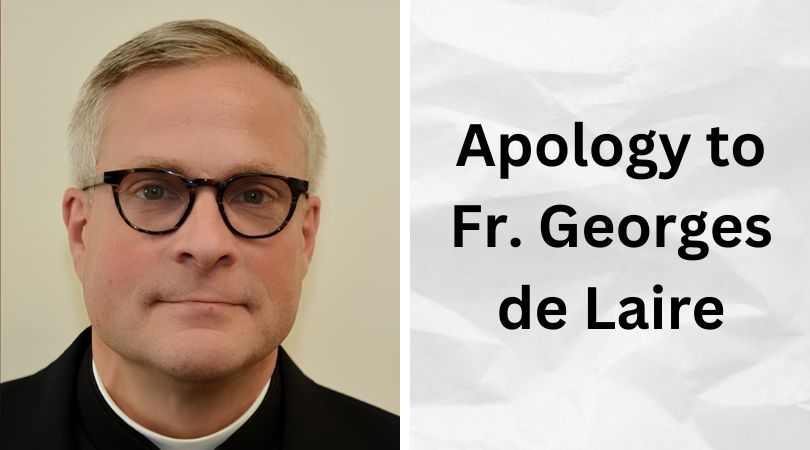DETROIT (ChurchMilitant.com) – Pope Francis is continuing to uphold Church teaching on the topic of women’s ordination. The Roman pontiff reaffirmed Catholic teaching on Holy Orders in an interview about a recently released book on the pastoral nature of his pontificate.
In an interview about the June 2023 book, whose title translates to The Shepherd: Struggles, Reasons, and Thoughts on His Papacy, Francis declared, “Holy orders is reserved for men” and the diaconate “is the first degree of holy orders in the Catholic Church, followed by the priesthood and finally the episcopate.”
The Holy Father proclaimed,
I think we would undermine the essence of the Church if we considered only the priestly ministry, that is, the ministerial way. The fact that the woman does not access ministerial life is not a deprivation, because her place is much more important. I think we err in our catechesis in explaining these things, and ultimately we fall back on an administrative criterion that does not work in the long run.
The Italian translation, made available on Tuesday, is titled Non Sei Solo: Sfide, Risposte, Speranze, meaning “You Are Not Alone: Challenges, Answers, Hopes.” The authors of the book, titled El Pastor: Desafíos, razones y reflexiones sobre su pontificado, are Argentine journalist Sergio Rubin and Italian journalist Francesca Ambrogetti.
Francis Echoes Prior Sentiments
Francis made similar comments last year to pro-gay America magazine. When asked about women who feel “called” to the priesthood, Pope Francis pronounced:
It is a theological problem. I think that we amputate the being of the church if we consider only the way of the ministerial dimension (ministerialidad) of the life of the church. The way is not only [ordained] ministry. The church is woman. The church is a spouse. We have not developed a theology of women that reflects this. The ministerial dimension, we can say, is that of the Petrine church. I am using a category of theologians. The Petrine principle is that of ministry. But there is another principle that is still more important, about which we do not speak, that is the Marian principle, which is the principle of femininity (femineidad) in the church, of the woman in the church, where the church sees a mirror of herself because she is a woman and a spouse. A church with only the Petrine principle would be a church that one would think is reduced to its ministerial dimension, nothing else. But the church is more than a ministry. It is the whole people of God. The church is woman. The church is a spouse. Therefore, the dignity of women is mirrored in this way.
There are three principles, two theological and one administrative. [There is] the Petrine principle, which is the ministerial dimension, but the church cannot function only with that one. The Marian principle, which is that of the spousal church, the church as spouse, the church as woman. And the administrative principle, which is not theological, but is rather that of administration, about what one does.
And why can a woman not enter ordained ministry? It is because the Petrine principle has no place for that. Yes, one has to be in the Marian principle, which is more important. Woman is more, she looks more like the church, which is mother and spouse. I believe that we have too often failed in our catechesis when explaining these things. We have relied too much on the administrative principle to explain it, which in the long term does not work.
Pope Francis went on to credit women for what he called “a great ecclesial intuition.” Francis also rebutted in the book interview several claims about women and married priests being needed in order to solve many of the Church’s current problems.
“Lutherans ordain women, but still few people go to church,” the pope detailed. “Their priests can marry, but despite that they can’t grow the number of ministers.”
Francis acknowledged the crisis in the Church is much deeper than the surface issues some continue to focus on.
“The problem is cultural,” the pontiff rued. “We should not be naive and think that programmatic changes will bring us the solution. Mere ecclesiastical reforms do not serve to solve underlying issues. Rather, paradigmatic changes are what is needed.”
Pope Francis similarly echoed in his 2019 letter to the German bishops:
I remember that in the meeting I had with your pastors in 2015 I told them that one of the first and greatest temptations in the Church was to believe that the solutions to current and future problems would come only from purely structural or bureaucratic reforms, but that, at the end of the day, they would not have touched the vital nuclei that need attention. “It is a sort of new Pelagianism, which leads us to place trust in administrative structures, in perfect organizations. Excessive centralization, rather than helping, complicates the life of the Church and its missionary dynamic (cf Evangelii Gaudium, 32).”
At the heart of this temptation there is the thought that, faced with so many problems and shortcomings, the best response would be to reorganize things, make changes and indulge in “mending” in order to adapt the life of the Church to the prevailing logic or the logic of a particular group.















